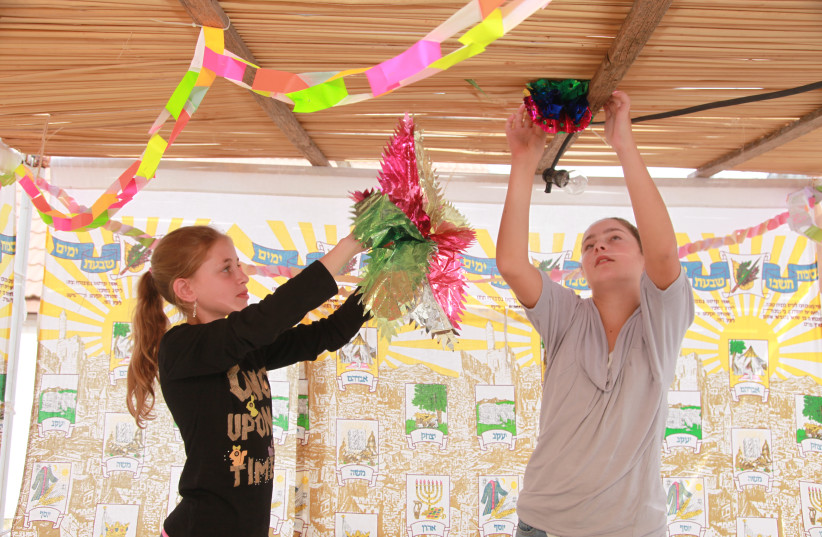As Jews in Israel and the Diaspora begin celebrating Sukkot Friday evening, what relevance does the holiday have to the current situation in the Jewish state, the Jewish world, and the world at large?
According to Leviticus 23, during the festival of Sukkot, we are instructed by God to “live in sukkot for seven days: All native-born Israelites are to live in sukkot so that your descendants will know that I had the Israelites live in sukkot when I brought them out of Egypt.”
The main mitzvah (commandment) is to build a sukkah – a temporary hut with a roof made of greenery – and invite friends, family, and guests to join us for a meal. Because Sukkot is also the harvest festival, we are told to bless the Four Species, representing diversity, three of which (the palm, myrtle, and willow) are bound together and which we shake together as we also cradle the etrog (citron).
Guests are referred to by the Aramaic word, ushpizin, an inclusive term referring also to strangers, to remind us that the Jewish people were once strangers in Egypt and encourage us to welcome strangers into our homes.

In this regard, it is noteworthy that the International Christian Embassy Jerusalem (ICEJ) is bringing some 3,000 Christians from more than 80 nations to attend its annual Feast of Tabernacles celebration, in solidarity with Israel. “The variety of Feast pilgrims this year includes national delegations from nearby countries such as Egypt and Turkey all the way to a large group of Fijian pilgrims coming from the ends of the earth on a chartered flight of Fiji Airways, which will be making the airline’s first-ever landing in Israel,” the ICEJ said in a press release.
Sukkot's dual identity
According to Rabbi Shlomo Riskin, Sukkot has a dual identity. ”On the one hand, it is a desert festival celebrating our desert wanderings and survivals while living in flimsy booths,” he wrote. “However, the second identity of Sukkot, relating to the Four Species, representing our conquest and inhabitancy of our homeland, signals the beginning of redemption.”
So Riskin asked: Which Sukkot do we celebrate? The answer: “Both at the very same time!”
The late Rabbi Lord Jonathan Sacks called Sukkot the festival of insecurity. Sukkot, he argued, is a metaphor for the Jewish condition not only during the 40 years of wandering in the desert but also the almost 2,000 years of exile and dispersion.
“I have often argued that faith is not certainty: faith is the courage to live with uncertainty,” Rabbi Sacks explained. “I find that faith today in the people and the State of Israel. It is astonishing to me how Israelis have been able to live with an almost constant threat of war and terror since the state was born, and not give way to fear.”
He quoted the Rashbam, Rashi’s grandson, as saying that Sukkot exists to remind us of our humble origins so that we never fall into the complacency of taking freedom, the Land of Israel, and the blessings it yields, for granted.
“Today’s Israel is a living embodiment of what it is to exist in a state of insecurity and still rejoice,” Sacks stated succinctly. “And that is Sukkot’s message to the world.”
The 21st century, he predicted, will one day be seen by historians as the Age of Insecurity. “We, as Jews, are the world’s experts in insecurity, having lived with it for millennia,” he wrote. “And the supreme response to insecurity is Sukkot, when we leave behind the safety of our houses and sit in sukkot mamash (literally), in huts exposed to the elements. To be able to do so and still say, this is zeman simchatenu, our festival of joy, is the supreme achievement of faith, the ultimate antidote to fear.”
Faith is the ability to rejoice in the midst of instability and change, traveling through the wilderness of time toward an unknown destination, Sacks concluded.
This year, when both Israel and the Diaspora are so deeply divided, it is incumbent upon us to set aside our differences and come together on Sukkot to celebrate the 75 years of our independence as well as our resilience as a people and replenish our faith for the future.
Chag Sameach (Happy Holiday)!
